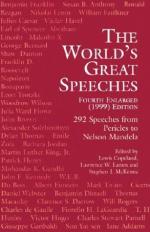
|
| Name: _________________________ | Period: ___________________ |
This test consists of 15 multiple choice questions and 5 short answer questions.
Multiple Choice Questions
1. Who was a radical advocate during the Reign of Terror that inspired the National Assembly and people to fight the enemies of the Revolution?
(a) Desmoulins.
(b) Louis XVI.
(c) Danton.
(d) Mirabeau.
2. Why were unions first formed?
(a) To defend workers against wage reductions and unfair treatment.
(b) To fight for healthcare for workers.
(c) To fight for employer issued uniforms.
(d) To fight for wage increases.
3. Who gave the speech known as the "Funeral Oration?
(a) Julius Caesar.
(b) Socrates.
(c) Pericles.
(d) Demosthenes.
4. According to Cicero, who had upheld and continued to uphold freedom by zeal and wisdom?
(a) Lucius Opimius.
(b) Caius Caesar.
(c) Caius Marius.
(d) Marcus Fulvius.
5. Who was known as the "Liberator of South America" and was a great military leader and statesman?
(a) Cortez.
(b) Jan Smuts.
(c) Poncho Villa.
(d) Simon Bolivar.
6. Who was the Senator of Massachusetts that was probably the most militant advocate of the abolition of slavery in Congress?
(a) William Seward.
(b) John Calhoun.
(c) Henry Clay.
(d) Charles Sumner.
7. According to the speech "Speaking for the Consumer", what percentage is the middle class worker and consumer?
(a) 80%
(b) 60%
(c) 70%
(d) 50%
8. Who told the troops that men under his command are only his allies?
(a) Adolf Hitler.
(b) Napolean Bonaparte.
(c) Leon Trotsky.
(d) Frederick the Great.
9. According to Smuts, what was the greatest military empire that ever existed?
(a) Byzantine Empire.
(b) Roman Empire.
(c) Persian Empire.
(d) German Empire.
10. Who did Grover Cleveland refer to as a discoverer, dreamer, hero and apostle?
(a) Meriweather Lewis.
(b) Magellan.
(c) Columbus.
(d) Ponce de Leon.
11. Who believed that we have many things to learn from the West?
(a) Mohandas Ghandi.
(b) Sun Yat-sen.
(c) Simon Bolivar.
(d) Rabindranath Tagore.
12. In the speech "Nationalism in India", how did the speaker feel that the countrymen will truly gain their India?
(a) By fighting against the government.
(b) By fighting against education.
(c) By fighting against Christianity.
(d) By fighting against Muslims.
13. In what year was "On the Crown" written?
(a) 540 B.C.
(b) 344 B.C.
(c) 330 A.D.
(d) 330 B.C.
14. According to Cardinal Mercer, who was the most authoritative teacher of Christian Theology?
(a) St. Francis.
(b) St. Augustine.
(c) St. Thomas Aquinas.
(d) St. Benard.
15. In the speech "Funeral Orations" the speaker addressed which group of people first?
(a) The sons.
(b) The victims.
(c) The barbarians.
(d) The forefathers.
Short Answer Questions
1. Who led the famous Pullman strike and identified with the Socialist movement?
2. Who was a Puritan theologian that was famous for his sermons on sin, hell and punishment?
3. What empire did Isocrates tell Greece to resist?
4. Who was the leader of the Conservative party and was highly respected for his efforts toward Canadian prestige and unity?
5. According to Daniel Webster, who erected the government of the U.S.?
|
This section contains 456 words (approx. 2 pages at 300 words per page) |

|




